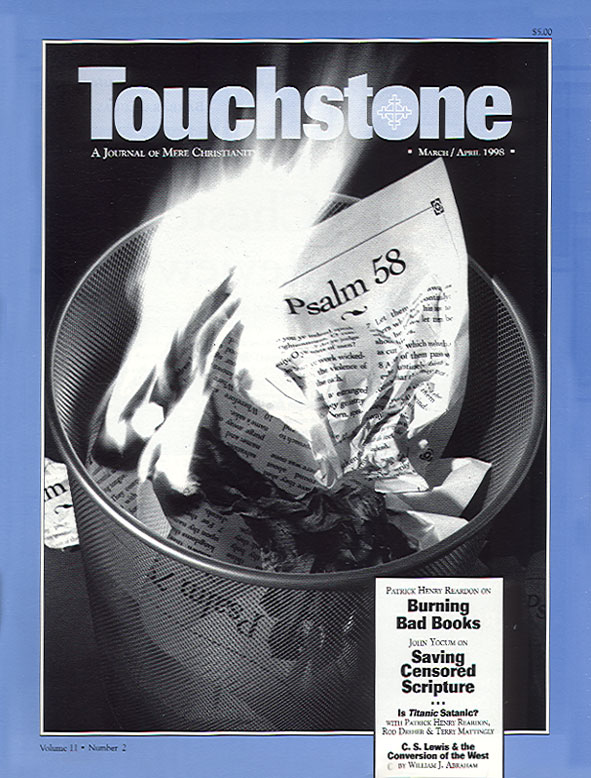Is Titanic Satanic?
An Internet Discussion Between Patrick Henry Reardon, Rod Dreher & Terry Mattingly
Patrick Henry Reardon:
Having read several conflicting assessments of the new movie Titanic, Denise and I last night finally shelled out the fifteen dollars that it cost the two of us to see it. My own view: Titanic is not only bad, it is very, very bad.
Technically more correct on certain details of the sinking, it is nowhere near so good as A Night to Remember. Reportedly the largest movie production in history, Titanic rivals the grandeur of its subject in sheer size and bulk. (Thus, it is better than the Clifton Webb film of the same name from back in the ’50s). It tries to do as a work of art what that famous ship attempted as a work of technical progress. Both productions thus make the same kind of statement.
It is a statement of rebellion against God. One critic called its theme trivial. Fair enough as far as it goes, I suppose, but it is worse than trivial. It is satanic. When, near the end of the film, the heroine Rose says of her erstwhile lover, Jack Dawson, “He saved me in every way that a human being can be saved,” she summed up my own theological and artistic objections to the film.
This film does the equivalent of holding up your hand in front of your face so that it appears to be larger than the sky. The problem is that it precludes your seeing how large the sky really is. The film’s story line puts the actual drama of the ship into the background and concentrates your attention on the silly story of a teenage girl trying to escape from a planned marriage by getting involved with a boy artist in the steerage section of the ship. The almost cosmic tragedy of the ship’s significance is blotted out for the sake of a teenage attachment. Sorry, I have raised teenagers, so give me a break.
If you want two hours of excitement with a bit of steamy sex thrown in with a certain shallow level of interpersonal moralizing, go see The English Patient. If you want to lengthen the experience to three hours, go see Titanic. Or you can save money by just taking down a volume of Hemingway and spending a week on it.
Rod Dreher:
I don’t see how you get “satanic”—an adjective applied to something of the utmost wickedness—out of this movie. I found a lot of truth in this movie—a humanist truth, to be sure, one that is imperfect in light of the gospel, but hardly satanic. Jack saved Rose’s physical life, but he also saved her from a life of stultifying convention as the wife of a harsh, unloving mogul. We—Christians in the audience—know what Rose (and the film’s writer, James Cameron) do not: she has a soul in need of saving, too. I think this philosophical/theological error is a flaw, but it didn’t ruin the movie for me, and I appreciated what truth there was in the film.
I agree completely that the romance was trite (along with the dialogue), but otherwise I had the opposite reaction. That is, the almost cosmic tragedy of all those people dying was magnified by observing its effect on the lives of two of the ship’s passengers. Those two souls had their destinies fixed by the ship’s sinking. I recall thinking on my way out of the theater about how the personal tragedies of those two must have been magnified by an entire shipload of men and women, each with a name and a face and families who loved them and wanted to see them at the dock in New York. I was reminded of the Hasidic saying often quoted by Elie Wiesel, which goes something like, “When one person dies, an entire universe dies with him.” I felt that, even though the love story was pretty cheap. Hey, it was melodrama. I didn’t expect much more than that.
In fact, what made me really like the film, even though I went in expecting to hate it, was how Cameron really emphasized the cosmic nature of the tragedy. It was hard to avoid seeing the fate of the Titanic as a metaphor for hubris, and the ultimate folly of human endeavor. The fact that we knew what awaited the ship in the ocean lent so much pathos to the gaiety of the passengers and the pride of the ship’s owners and designer. I think my favorite shot in the film was one Cameron used, as a variation, more than once. It followed a scene of merriment, I think, and was a bird’s-eye view of the ship sailing into dark waters on an open sea. I immediately thought that this must have been how God saw the boat from on high; it was so big and so impressive from the human point of view onboard, but seen from so high, it was a lonely little vessel moving implacably and ignorantly toward its doom. That really got to me.
Patrick Henry Reardon is pastor emeritus of All Saints Antiochian Orthodox Church in Chicago, Illinois, and the author of numerous books, including, most recently, Out of Step with God: Orthodox Christian Reflections on the Book of Numbers (Ancient Faith Publishing, 2019).
subscription options
Order
Print/Online Subscription

Get six issues (one year) of Touchstone PLUS full online access including pdf downloads for only $39.95. That's only $3.34 per month!
Order
Online Only
Subscription

Get a one-year full-access subscription to the Touchstone online archives for only $19.95. That's only $1.66 per month!
bulk subscriptions
Order Touchstone subscriptions in bulk and save $10 per sub! Each subscription includes 6 issues of Touchstone plus full online access to touchstonemag.com—including archives, videos, and pdf downloads of recent issues for only $29.95 each! Great for churches or study groups.
Transactions will be processed on a secure server.
more from the online archives
calling all readers
Please Donate
"There are magazines worth reading but few worth saving . . . Touchstone is just such a magazine."
—Alice von Hildebrand
"Here we do not concede one square millimeter of territory to falsehood, folly, contemporary sentimentality, or fashion. We speak the truth, and let God be our judge. . . . Touchstone is the one committedly Christian conservative journal."
—Anthony Esolen, Touchstone senior editor










